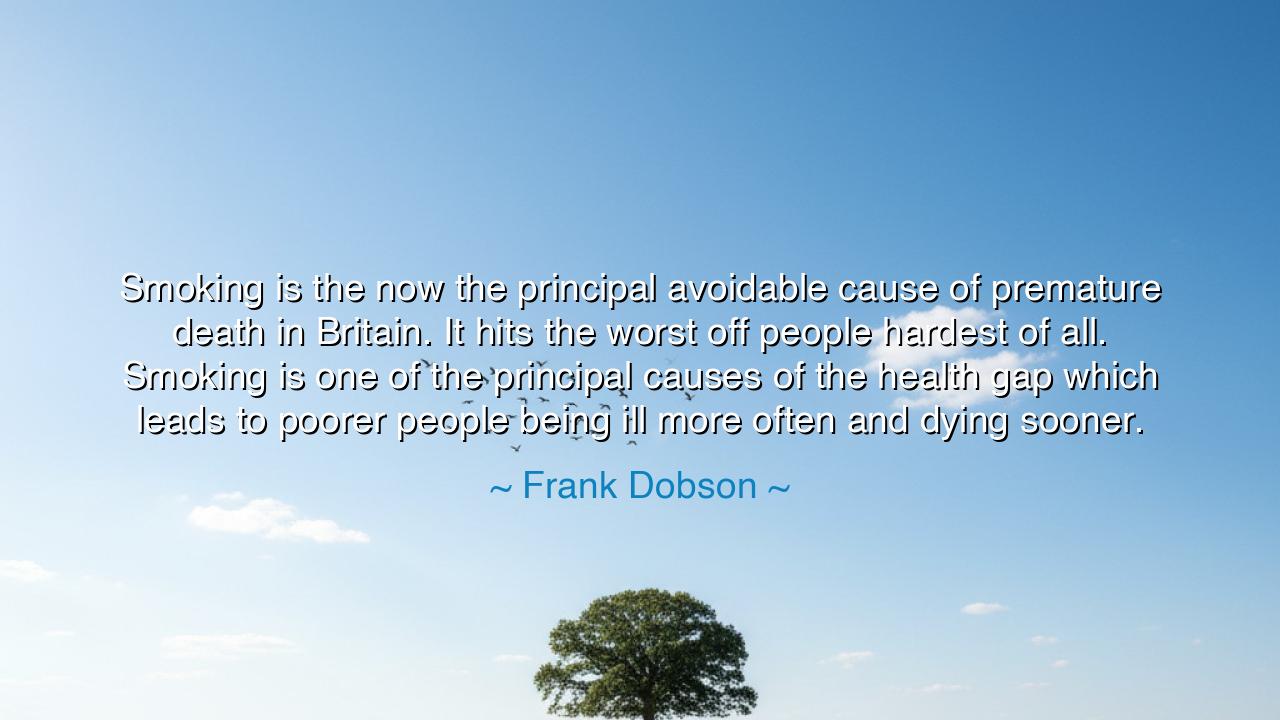
Smoking is the now the principal avoidable cause of premature
Smoking is the now the principal avoidable cause of premature death in Britain. It hits the worst off people hardest of all. Smoking is one of the principal causes of the health gap which leads to poorer people being ill more often and dying sooner.






“Smoking is now the principal avoidable cause of premature death in Britain. It hits the worst off people hardest of all. Smoking is one of the principal causes of the health gap which leads to poorer people being ill more often and dying sooner.” Thus spoke Frank Dobson, a servant of the people and a guardian of public welfare, whose words cut through complacency like a bell tolling in the night. In this declaration lies not only a warning about the peril of smoking, but a lament for the deeper wound within society—the cruel divide between privilege and poverty, between knowledge and neglect. His words are not merely about the destruction of the body, but the sickness of the world that allows the weakest to bear the heaviest burden.
Dobson’s cry was born in a time when the truth could no longer be ignored. Smoking, once a symbol of sophistication and leisure, had revealed its true nature—a silent reaper cloaked in habit and addiction. The science was clear: tobacco ravaged the lungs, poisoned the blood, and struck at the heart. Yet even as this truth spread, the chains of dependence tightened most cruelly around those least able to escape. The poor, the overworked, the weary souls seeking a moment of solace, found in the cigarette a false comfort—one that soothed the nerves but devoured the years. Thus did smoking become not merely a vice, but an emblem of inequality, a mark of the world’s injustice.
Dobson’s words echo the wisdom of the ancients, who taught that true justice is measured by the well-being of the least among us. To say that smoking hits the worst off people hardest is to reveal a deeper truth: that when poverty and suffering join hands, the choices of the poor are shaped not by freedom, but by circumstance. The wealthy may buy their cures, but the poor must endure their illnesses. In this way, smoking widens the chasm between lives of comfort and lives of struggle, creating what Dobson called the health gap—a gulf where hope itself grows thin, and where men and women die not because they must, but because the world has failed to protect them.
In every age, the voice of truth must rise against the tide of profit. The empire of tobacco, built on deception and desire, was long defended by those who grew rich from the suffering of others. Even as the evidence of death mounted, advertisements painted the act as glamorous, heroic, free. But what freedom is there in dependence? What heroism in slow destruction? The smoke that rose from a million cigarettes was the incense of a quiet tragedy—one that burned away health, dignity, and years of life, especially among those who could least afford the loss. Dobson’s words, like a prophet’s, call us to see this not as mere personal failing, but as social injustice, a wound upon the moral body of the nation.
Consider the story of John, a factory worker from London’s East End, whose life mirrors the truth of this saying. He began smoking at fourteen, not from rebellion but from exhaustion—a small comfort in long hours of labor. Each cigarette was a breath of relief, a promise that he could endure the day. Yet by forty, his lungs betrayed him; by fifty, he was gone. His story is not rare—it is the story of thousands, each life shortened not by fate, but by circumstance. Smoking, in its cruelest form, preys on despair. It offers relief to the weary while it robs them of their future. And in this way, it becomes not merely a personal tragedy, but a social sin.
Yet Dobson’s message, though grim, is not one of condemnation—it is a call to courage and to compassion. If smoking is the principal avoidable cause of death, then it is within our power to end its reign. But the struggle is not only against the cigarette—it is against the conditions that make people reach for it. To heal this health gap, society must not only warn the people, but uplift them. Education, support, and justice are the medicines that can cure what smoke has stolen. The fight against tobacco is, in truth, a fight for equality—one that demands both knowledge and mercy.
So, my children, take heed of these words. Do not be seduced by the whisper of false comfort that promises peace but delivers poison. To be strong is not to yield to habit, but to master it. To be wise is to guard the vessel of life with reverence, knowing that your breath is sacred and your years are precious. And to be just is to care for others who struggle in darkness—to lift them, to teach them, to stand beside them in their battle for health and dignity.
For in the end, as Dobson reminds us, no death born of smoking need happen. Each one is a life that might have been saved, a flame that might have burned longer and brighter. Let us then live—and help others to live—not in smoke and sorrow, but in the clear air of compassion, courage, and hope.






AAdministratorAdministrator
Welcome, honored guests. Please leave a comment, we will respond soon